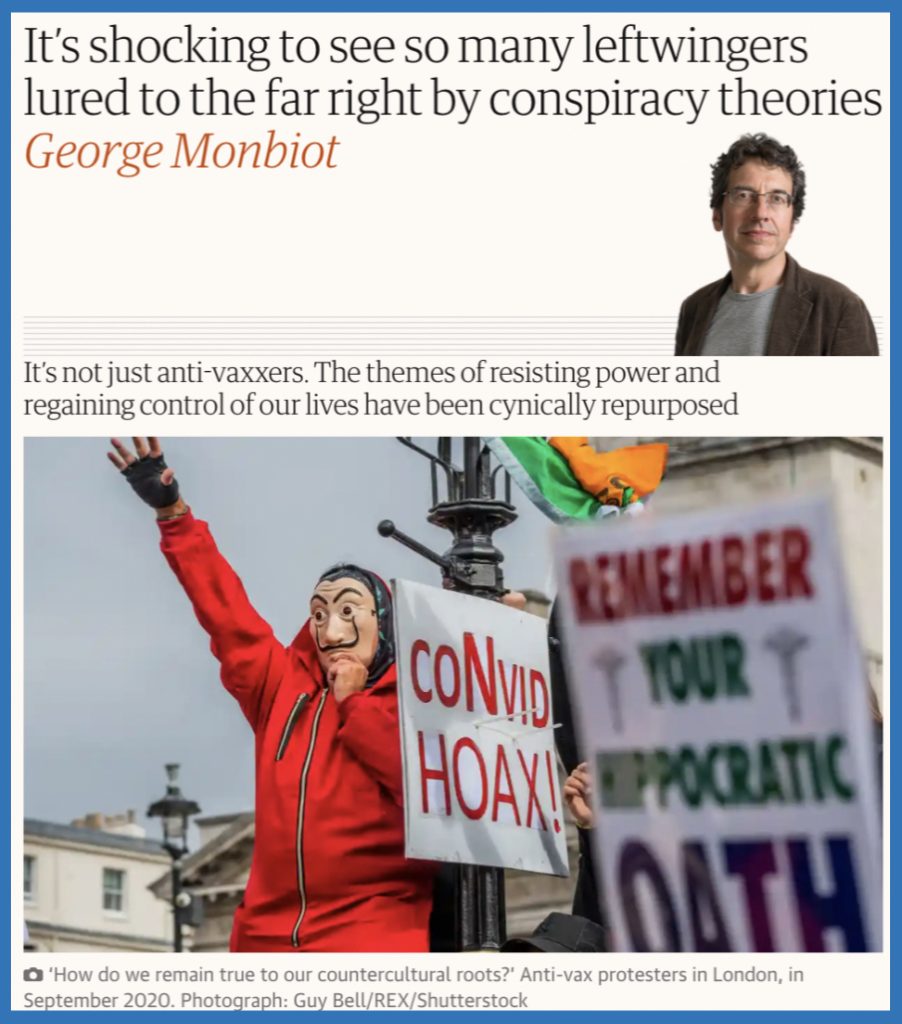
Thoughtcrime will NOT be tolerated
Using particular labels has become the unbeatable weapon du jour of online warfare. If you successfully brand someone a racist, a conspiracy theorist, an anti-vaxxer, alt-right or an antisemite (ideally several of these at once), you neutralise everything-they-ever-said-ever. Boom. Done. You’re finished. Next.
A significant majority of the UK population still consumes and trusts mainstream media. No matter how dissonant to real life this version becomes, legacy media outlets continue to behave like Orwell’s Ministry of Truth and are largely getting away with it. Modus operandi: memory-hole inconvenient truths, destroy dissenters and refuse to cover any events that threaten Le Narrative™. Business as usual.
A picture paints a thousand words, as the saying goes, so let’s examine a paradigm example from George Monbiot in the Guardian, way back in 2021:

This delightful piece is replete with a Nazi salute, the use of ‘anti-vaxxer’ and conspiracy theorist slurs, a masked madman, a ‘convid hoax’ poster topped off with a title suggesting that you must be far right if you even dare to entertain any associated wrongthink. The Guardian has managed, in one fell swoop, to totally delegitimize anyone asking any questions about the covid narrative. After all, who wants to risk being lumped in with this masked nutjob? Keep your head down, your thoughts to yourself and ideally stop thinking them altogether. The parapet does not require your presence, move along please.
As with so much propaganda nowadays, this headline weaponises the threat of ostracism. Kipling Williams, a Professor of Psychology at Purdue University is a leading expert on this topic and notes the following:
“The fear of social exclusion is so salient, most bystanders will adopt the behaviour of the aggressor, ensuring their “in-group” membership, as opposed to risking possible retaliation for questioning group norms.”
Social conformity and fear of ostracism have the power to heavily influence our opinions, even if we have done no personal research on a given topic. Why bother researching when these clever, trusted, virtuous kind people who use big words have done it for us? Very early in life, children detect that certain things are not socially acceptable and are going to land them in the holy hell of social isolation. These thoughts and actions will be deftly avoided at all costs, with no need for further inquiry. It is a coping mechanism that is learned extremely young and persists into adulthood.
The more years spent in institutions of learning, the more exposure to this thought taming a person will be subjected to. In the extremely unnatural, highly age-stratified environment of the education system where thought crimes could mean instant and permanent group exclusion, it doesn’t seem worth the risk, does it? Arguably this might be even more powerful in a 24/7 environment such as boarding school. Self-censorship in full force all day, every day.
Is it a coincidence that people from such institutions are overrepresented in government? The parallels between Westminster and a boys’ public school aren’t exactly cryptic; keeping everyone in a carefully constructed hierarchy, using similar bullying techniques as those seen in a school playground if anyone steps out of line (see recent treatment of Andrew Bridgen for details). Isolate, humiliate, smear, evict. Rinse and repeat. The message is loud and clear: if you deviate from the Party Line you will be severely punished.
Institutionalised groupthink has the potential to be very dangerous and with bizarre and rapid shifts in what constitutes age-appropriate education, many parents have legitimate concerns about exactly what and how children are now being taught to think. A former OFSTED Inspector, Teacher and Teacher Educator of 40 years had the following comment:
“An examination of the National Curriculum (for England and Wales) will reveal that critical thinking and critical reading skill development have been incrementally edited out in subsequent drafts since its inception.”
If children aren’t encouraged to critique material put before them, then they won’t be asking questions of it or forming their own opinion of it. They become passive consumers of the text. Why would this be the evolving trend in education? Who does this serve? It would be interesting to know whether this is a factor in the huge increase in parents choosing to homeschool here in the UK.
The amount of money being spent by governments and institutions worldwide on ‘nudge’ units in various guises indicates that those wishing to shape the prevailing narrative fully understand the primordial fear of ostracism and are more than happy to weaponise it. Who wants to be called a racist? Absolutely no one ever. Guilt and shame are unbelievably powerful tools which can be used to moderate behaviour very effectively. But can one be ‘innoculated’ against these underhand psy-op tactics? The first step towards Thought Recovery appears to be awareness. Once you see it, you can’t unsee it, and there is certainly no going back. The culture of memes that sprang up in recent years beautifully satirises the point. In what was primarily a psychological war, memes played an important role in boosting the morale of those swimming against the tide of public opinion. The Chad vs NPC series were particularly powerful in highlighting the obvious inconsistencies in The Science™.

Most people do not like to feel as though they have been played any more than they like the idea of social isolation. At a certain point, if one believes that those doing the manipulating may have nefarious intentions, one may be persuaded to not just ‘go along to get along’, even at risk of being labelled a racist, climate denying, anti vax, alt right conspiracy theorist. Many people who supported Brexit will be familiar with this concept, as they were relentlessly called racists by the media machine and in turn by many of their friends and family. They learned to keep it to themselves but in the end, voted leave anyway. If we want to preserve truth as a valuable commodity in society, we must teach young people to critically think and to speak up when they believe something is ethically and morally wrong. If they are no longer being taught these basics in school, it falls to parents to ensure this education is completed at home. The total outsourcing of teaching is no longer a safe option for society.
For those who read George Orwell’s 1984 at school but can only vaguely remember the contents, we highly recommend refreshing your memory. It is utterly chilling in the context of what is going on in the real world. Perhaps it would make a good Christmas or birthday present for anyone stating that everything is hunky dory, we’re back to normal and there’s really nothing to worry about. Here is one of many prescient excerpts:
“The whole climate of thought will be different. In fact there will be no thought, as we understand it now. Orthodoxy means not thinking—not needing to think. Orthodoxy is unconsciousness.”
And in case you’re still not convinced, how about this one:
“There will be no love, except the love of Big Brother. There will be no laughter, except the laugh of triumph over a defeated enemy. There will be no art, no literature, no science. When we are omnipotent we shall have no more need of science. There will be no distinction between beauty and ugliness. There will be no curiosity, no enjoyment of the process of life. All competing pleasures will be destroyed.”
It seems Those In Charge have taken 1984 as a detailed instruction manual rather than a fictional novel. Let’s not let the end play out as written!
